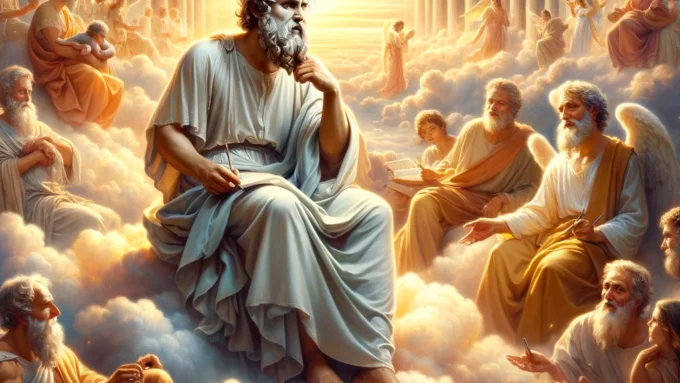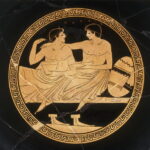
Accepting Death: Socrates and His View of Love
A few weeks ago, I celebrated my birthday. With each birthday, not only do I mark another year of growing older and, perhaps, wiser, but I also acknowledge that I am a year closer to the end of my life, which is what we usually called, death. Congratulations are in order, for I am closer to death.
In traditional East Asian, especially Chinese, families, discussing death is taboo, they believed talking about death will bring bad fortunate. However, my family diverges from this norm. I relish discussing death at family dinners, as long as it’s not during the Chinese New Year. It’s crucial to remember that death is an inevitability for us all, be it tomorrow, next year, or on some random day, possibly alone or with loved ones. For me, it could be at this very moment, which is now, but it’s a certainty that awaits regardless. I despise evading inevitable truths and indulging in falsehoods.
Confronting death may not seem pressing, yet as we journey through life, we witness the passing of those around us, one by one. The death of a family member who grew up with us serves as a poignant reminder that the bonds we cherish may not last forever. Ultimately, everyone must face their mortality; it’s an unavoidable aspect of life. But what does death entail? At its most fundamental, death signifies the cessation of existence: no consciousness, no feelings. Every precious moment we’ve experienced in life, gone forever.
This brings us to a crucial question: if our end is inevitable, what’s the point of living? Why exist if everything is destined to disappear? Death serves as a reminder to cherish each moment, for it can intrude upon our lives at any second. Thus, some choose to embrace the “happiness” in their lives, working for wealth only to indulge in momentary pleasures, using busyness to forget the looming spectre of death. This avoidance strategy is particularly prevalent among Chinese communities, but is it truly effective?
If you’re contemplating this question, like I am, then you’re someone I hold dear. The answer to dealing with death, I believe, lies in love, as Socrates might argue. I will explain it.
Socrates diagnosed the cause of death anxiety as a failure to recognise the immortality of the soul. Why do we fear death? In Socrates’ view, it’s because we live too narrowly, we are believing our essence to be tied solely to our physical form. We fear that with the death of our body, we cease to exist entirely, succumbing to nothingness. However, Socrates argued that this is a misconception; our most fundamental essence is not our body but our soul.
To Socrates, the understand of soul is not in some superstitious fairy tales or some religion. Instead, in a more neutral, modern interpretation, it represents human consciousness or the spiritual existence of a person. This spiritual essence, unlike the physical body, is immortal. The ancient Greek people often adopted a dualistic view of humanity, distinguishing between the body and the soul, with the latter one considered superior and eternal.
Socrates’ philosophical demonstrations of the soul’s immortality are found in Plato’s Phaedo or also as known as On the Soul, set in the prison where Socrates spent his final days. The philosophical argument for the immortality of the soul was a significant part of the life of the philosopher Socrates, especially during his last philosophical discussion. We all know how Socrates met his end, an event recorded by Plato in his “Apology.” Socrates was condemned by 500 Athenian citizens at the Athenian Assembly and sentenced to death by democratic vote. Ironically, this democracy, which sentenced him to death, effectively killed philosophy. Socrates was accused of “corrupting the youth” and “impiety.”
The death of Socrates is often compared to the death of Lord Jesus, both being pivotal events that deeply affected Western civilisation. Thus, Socrates truly faced death, not just any death, but a sudden and abnormal one. After being sentenced to death in his defence, Socrates, before his execution, demonstrated his philosophy of death through his attitude and actions.
Socrates was not afraid of death at all. His approach to his impending death can be summarized in four words: he went to his death calmly. This is famously depicted in the world-renowned painting “The Death of Socrates” by the French painter Jacques-Louis David, which shows Socrates on the last day of his life in Phaedo, engaging in philosophical discussion. According to Athenian law, executions could only be carried out after sunset. Everyone thought that Socrates was going to die at sunset, and they were all extremely sad and at a loss for words. Socrates, on the other hand, was chatting and laughing as if it were a normal day. His students asked him why he was not afraid of death at all. This question was what Socrates had been waiting for.
With little time left, he seized the opportunity to engage in philosophical discussion. Thus, Socrates began his philosophical argument for the immortality of the soul. He did not just present a single argument; rather, he demonstrated the immortality of the soul from multiple perspectives. Here, we have summarized three typical arguments.
The first premise of the Argument from Opposites is that all things come into being from their opposite states. For instance, large things come from small things, implying that small things grow larger, and conversely, large things become small. Similarly, cold things and hot things, beautiful and ugly things, and just and unjust things all arise from their opposites. This concept should be easy to grasp. The second premise is that there is a symmetrical process of transformation between two opposites, such as the process of growing larger from being small and vice versa. This symmetry applies to becoming cold or hot, beautiful, or ugly, just or unjust. These pairs of opposites have symmetrical transformation processes.
If we apply the first premise to the opposites of life and death, we recognize that they are also a pair of opposites. Introducing the third premise, we understand that death comes from life, a phenomenon we observe as people live and eventually die.
According to the second premise, since the transformation process between opposites is symmetrical, the transition from life to death implies a corresponding opposite process, which we can refer to as rebirth. If death signifies the separation of soul and body, then after death, the soul cannot cease to exist. Otherwise, rebirth would not be possible, violating the principle of symmetry. Thus, the soul does not perish with the body’s death.
This argument posits that the soul exists after death but does not necessarily prove its immortality, as it does not guarantee the soul’s existence before life. However, Socrates introduces the Theory of Recollection to argue that the soul exists before birth.
The first premise of the Theory of Recollection is that acquiring knowledge through remembering something previously known is called recollection. Recognition of something implies prior knowledge, suggesting that knowledge of something never seen before is not possible.
The second premise states that all tangible things in the real world do not embody abstract concepts perfectly. For example, no physical circle can perfectly match the abstract concept of a “perfect circle” defined geometrically as all points equidistant from a center point. Even the most precisely made circular objects deviate from this definition, indicating that no tangible object perfectly matches abstract concepts.
The third premise is that we possess knowledge of abstract concepts themselves, despite the imperfection of tangible examples. For instance, we can identify a table as “circular” and compare the roundness of different tables, indicating pre-existing knowledge of the abstract concept of a “perfect circle.”
Given that knowledge comes either before or after birth, the conclusion is drawn that knowledge of abstract concepts cannot come from experiences after birth, as the physical world does not perfectly represent these concepts. Therefore, knowledge of abstract concepts must be innate, existing before birth. This suggests that our souls had “seen” these abstract concepts before our physical birth, allowing us to recall them when we encounter imperfect representations in the physical world. Hence, the soul exists before the body is born.
Very interesting thing is that our body will get older and older, eventually it will become dirt, just like what we were originally. Or more specifically, everything made by material will eventually get destroyed. Yet the concept of spirituality, such as the perfect circle, or math question 1+1=2, will always remain the same. The most intriguing part is, you can never find something that is perfectly circle, just like pi=3.1415926…, you can never find the exact number of pi because it is infinitely expanding. However, in this material world, there are still circles that remind us of the definition of the abstract concept of a “perfect circle,” even if the circle is imperfect.
Doesn’t this mean that there are things in us that are connected with the eternal spiritual concept? This means that the human soul, which is also a spiritual existence, is immortal. Therefore, the human soul is immortal.
Also, everything in this world has its essence to be existed. For instance, the light bulb exists to illuminate, and the fire exists to generate heat. What is the meaning of existed of Soul? Which is giving human life, making the human alive. Since the existence of a thing does not violate its essence, the same is true for the soul. Therefore, soul is not death. Which according to Socrates, soul would never die. Which is immortal.
Because of acknowledging that soul would never die, thus, Socrates didn’t fear of going to death. Therefore, even in the last day for Socrates, he was still talking about philosophy with his students.

For Socrates, philosophy is the practice of dying, the separating of the soul to its own autonomous existence. Dying stands for the separate of body and soul, but the soul is immortal, so the dying of body probably not a bad thing for philosophers. For Socrates, the soul already learns the knowledge before, the reason why we can have a rational understanding of some abstract ideas is because our soul has “seen” rational knowledge before coming to this material world and combining with the body. But due to the combination with the body, especially the body desire makes the human soul forget some rational knowledge.
Our body is a limitation of our soul, subjecting us to the distortion of the nature of things by our “senses”. Therefore, the process of learning rational knowledge involves striving to free we from the interference of the body to recall the pure ideas that the soul already knows. Thus, philosophy is the practice of dying, and the cultivation that philosophers must undertake is to rid themselves of the distractions of bodily desires to achieve a separation of soul and body. This allows for the unobstructed exploration of truth with pure reason, as if our bodies were already dead. Consequently, philosophers are well prepared for the death of the body, having nothing to fear, as they undergo this training daily. This is what Socrates was doing on the last day of his life.
Not like us, he didn’t cry, didn’t fear, didn’t kiss that one person for last time… Instead, he was still talking about philosophy because “philosophy is the practice of dying”. This is what we called live by his taught, he actually did what he taught to people. Because I know even my body died, but my soul still there, thus I don’t afraid about dying.
In Phaedo, Socrates’s students were crying while they know their teacher is going to be executed soon. However, Socrates was just calm and talking about philosophy topic. The sun has set, the executioner took out the poisoned wine, and Socrates drank it in one gulp, calmly accepting the fact of physical death. Socrates’s last words were, “Crito, we owe a cock to Asclepius; pay it and don’t forget.” After saying that, one of the greatest humanities gone, physically. Asclepius was a god of healing, it was the practice at the time to sacrifice a rooster to Asclepius after you are healed of a disease, suggested that Socrates view death as a cure, instead of a nightmare nor disease.
Death is not the ending of life, he still living in soul. He still alive, this article is a way that Socrates shows up his life. Socrates’ body did not tell his philosophy to you, but his soul told his thoughts through my body.
Thus, don’t forget, to pay back the chicken…
So how we deal with the fear of dying? In The Symposium, Socrates addresses the grand question of “what is love” by stating that desire is the desire for immortality. The greatest fear in life is death, yet love instills in us a longing for the immortal. Desire is a transcendence of finitude, with the aim of human desire being to become like the gods, eternal and immortal. So, how does desire lead one to pursue immortality? The method is through procreation; desire gives one the impulse to reproduce and have offspring. But how does one procreate? There are two ways of procreation. One way is through physical means, where encountering a beautiful body inspires one to pursue them and have physical offspring together. Even if one dies, one’s genes continue in the offspring, achieving immortality in a physical sense.
Another way is through studying, which is what we call philosophy. Philosophy is the mother of all subjects; it is the basis of all subjects. Knowledge and thoughts are eternal, immortal. When we learn knowledge and study truth, we connect ourselves with these eternal ideas, which are immortal.
Socrates also mentioned something called the Ladder of Love.

Individuals are often dominated by their senses, falling in love with someone because of the beauty of their body. Over time, as one encounters more and more people whom they find attractive, they realize that each beautiful person shares a common beauty, which is the essence of beauty itself. Beautiful girls are everywhere. From there, one’s appreciation evolves from the beauty of individual bodies to the beauty of the soul. Once you reach the level of appreciating the beauty of the soul, the beauty of the body becomes less important. What you appreciate is not the body anymore, but the person as a soulful being.
Advancing further, one ascends to a point where they fall in love with the beauty of knowledge. When asking scholars who are deeply versed in their disciplines why they are so passionate about their field of study, they all respond that it is because their subject is beautiful. Mathematicians, for example, will say that they see beauty in mathematics, and their love for their field is driven by this aesthetic appreciation of knowledge.
The highest stage on the ladder of love is the love of beauty itself, which is the idea of beauty, knowledge about beauty, and the truth of beauty. The ultimate realm of desire is the love of truth, which is the love of wisdom.
Our love of knowledge is a higher-level love, no longer the simplest physical desire. Instead, it is the love of the rational, the love of the immortal. The offspring of this love will no longer be another body; instead, it is the soul, the beautiful things, the ideas, knowledge. Socrates’ soul is immortal in this sense. Only knowledge and truth can make people immortal. It is in the sense of loving wisdom that love can achieve human immortality.
The physical desires allow human beings to exist, while the desire for knowledge makes human existence meaningful and valuable. The best way to deal with the fear of death is to find something you truly love; the love of material is short-lived. I like women, but I don’t love them. What we should really love is knowledge, God, the immortal ideals, which will stand forever.
When I told my mother I wanted to study philosophy, she was astonished because she didn’t know much about it. She thought some people might become depressed because there are too many problems in philosophy that need to be addressed. Because they can’t think about it, they may give up on their lives. But what philosophy truly teaches us is to love your life, which is the essence of humanity. Thus, stay rational.
Arkadaşım, go find something you love, and I wish you a great day and a happy life.


